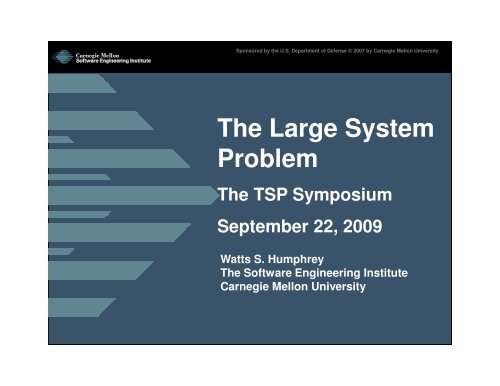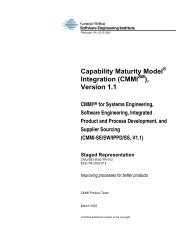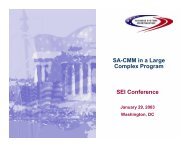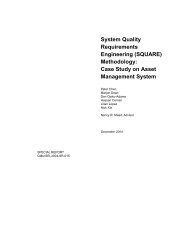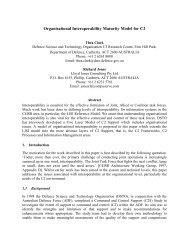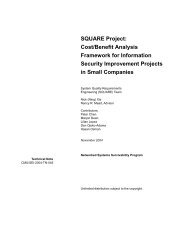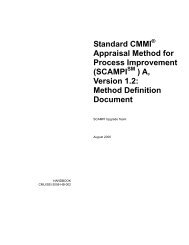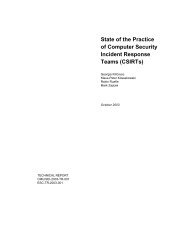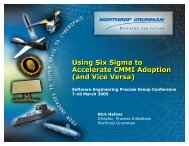The Large System Problem - Software Engineering Institute ...
The Large System Problem - Software Engineering Institute ...
The Large System Problem - Software Engineering Institute ...
Create successful ePaper yourself
Turn your PDF publications into a flip-book with our unique Google optimized e-Paper software.
Sponsored by the U.S. Department of Defense © 2007 by Carnegie Mellon University<br />
<strong>The</strong> <strong>Large</strong> <strong>System</strong><br />
<strong>Problem</strong><br />
<strong>The</strong> TSP Symposium<br />
September 22, 2009<br />
Watts S. Humphrey<br />
<strong>The</strong> <strong>Software</strong> <strong>Engineering</strong> <strong>Institute</strong><br />
Carnegie Mellon University<br />
page 1
Why Can’t We Develop <strong>Large</strong> <strong>System</strong>s?<br />
<strong>Software</strong> development projects often fail.<br />
<strong>The</strong> larger they are, the more likely they are to fail.<br />
IT Project Success % vs. Cost<br />
Project Cost ($ Million)<br />
12<br />
8<br />
5<br />
1.25<br />
0.5<br />
2%<br />
6%<br />
12%<br />
19%<br />
61%<br />
0% 20% 40% 60% 80%<br />
% Success<br />
Adopted from the Standish Chaos Report - 2009<br />
© 2008 by Carnegie Mellon University<br />
Introduction 2
<strong>The</strong> FAA <strong>System</strong><br />
<strong>The</strong> FAA Advanced Automation <strong>System</strong><br />
• contracted to a CMM level-3 organization in 1989<br />
• contractor later appraised at CMMI level 5<br />
Costs<br />
• original cost estimate, 1989: $4.3 B<br />
• interim cost estimate, 1994: $6.9 B<br />
• when cancelled, total spent: $2.6 B<br />
Clearly, being CMMI level 5 does not solve the cost and<br />
schedule problems.<br />
© 2008 by Carnegie Mellon University<br />
Introduction 3
Other Examples<br />
<strong>The</strong> IRS system – finally started to use<br />
in 2005<br />
• 5 years of delays<br />
• costs exploded to $2 B<br />
FBI system killed<br />
• 3 years late<br />
• $150 M spent<br />
• 5 CIOs, 9 program managers<br />
Clearly, changing managers did not solve the FBI’s problems.<br />
© 2008 by Carnegie Mellon University<br />
Introduction 4
This Is a Major <strong>Problem</strong><br />
A GAO study of 72 weapons programs<br />
• Projected costs up by 26%<br />
• Development costs up by 40%<br />
<strong>The</strong> New York Times<br />
• Two thirds of largest weapons over budget last year<br />
• Total extra cost: $296 B<br />
• Programs averaged 2 years behind schedule<br />
© 2008 by Carnegie Mellon University<br />
Introduction 5
Finding a Better Way<br />
For the last 25 years we have tried changing<br />
• managers<br />
• acquisition strategies and regulations<br />
• incentive systems<br />
• auditing procedures<br />
None of these changes has fixed the problem.<br />
<strong>The</strong>re must be a better way!<br />
© 2008 by Carnegie Mellon University<br />
Introduction 6
T h e P r o b l e m<br />
Development work has changed in the last 50 years.<br />
Project management methods have not.<br />
In the past, development work concerned things.<br />
• We produced items one could touch and feel.<br />
• <strong>The</strong> managers could understand the work by watching it.<br />
<strong>The</strong>se older methods were designed for supervising factory<br />
workers.<br />
© 2008 by Carnegie Mellon University<br />
Introduction 7
Traditional Management<br />
<strong>The</strong>se management methods<br />
were defined by Frederick<br />
Winslow Taylor 100 years ago.<br />
<strong>The</strong>y were designed for<br />
• largely uneducated workers<br />
• relatively simple manual labor<br />
Even though the work and<br />
workers have changed, Taylor’s<br />
methods are still used.<br />
© 2008 by Carnegie Mellon University<br />
Introduction 8
Taylor’s Management Principles<br />
Taylor’s methods rest on three<br />
principles.<br />
1. Management knows the best<br />
way to do the job.<br />
2. <strong>The</strong> managers can monitor the<br />
work by watching it.<br />
3. <strong>The</strong> workers cannot be trusted to do good work unless<br />
they are watched.<br />
© 2008 by Carnegie Mellon University<br />
Introduction 9
Knowledge Work<br />
Traditional management methods do<br />
not work for software because it is<br />
knowledge work.<br />
Drucker’s definition of knowledge work.<br />
• It involves concepts, ideas, designs.<br />
• It is done in the workers’ heads or on<br />
computers.<br />
• <strong>The</strong> workers often know more about<br />
the work than their managers.<br />
Knowledge work cannot be tracked and managed by<br />
just watching it.<br />
© 2008 by Carnegie Mellon University<br />
Introduction 10
T r a d i t i o n a l l y M a n a g i n g S o f t w a r e<br />
With Taylor’s methods, the manager’s job is to<br />
• define the job<br />
• plan the work<br />
• tell the workers how to do their jobs<br />
• monitor their performance<br />
• correct them when they do something wrong<br />
With these methods, the workers and managers have different<br />
objectives.<br />
• <strong>The</strong> managers want the maximum amount of work for the<br />
least cost.<br />
• <strong>The</strong> workers want maximum pay for the least amount of<br />
work.<br />
© 2008 by Carnegie Mellon University<br />
Introduction 11
Observations on Knowledge Work<br />
Knowledge work does not fit the principles for Taylor’s<br />
methods.<br />
With Taylor’s methods, the knowledge workers and<br />
managers have different views of project success.<br />
• <strong>The</strong> workers view projects as successful if they were<br />
technically interesting and rewarding.<br />
• <strong>The</strong> managers view projects as successful if they met their<br />
cost and schedule targets.<br />
Since groups rarely succeed when members and managers<br />
work to different objectives, software projects keep failing.<br />
It is also why large systems programs are unmanageable<br />
with today’s management methods.<br />
© 2008 by Carnegie Mellon University<br />
Introduction 12
<strong>The</strong> <strong>Large</strong> Project <strong>Problem</strong><br />
<strong>Large</strong> programs are typically composed of multiple small<br />
projects.<br />
<strong>The</strong> small projects can usually be managed with informal and<br />
unmeasured methods.<br />
When large programs are managed informally, they typically<br />
fail because of<br />
• unanticipated problems<br />
• unmet interdependencies<br />
• the blame culture<br />
© 2008 by Carnegie Mellon University<br />
Introduction 13
Unanticipated <strong>Problem</strong>s<br />
Fred Brooks best described the<br />
software management problem.<br />
“Schedules slip a day at a time.”<br />
To do his or her job, the manager<br />
must<br />
• know job status<br />
• recover from the daily schedule<br />
slips every day<br />
• keep management informed<br />
© 2008 by Carnegie Mellon University<br />
Introduction 14
Anticipating <strong>Problem</strong>s<br />
To anticipate project problems, the managers must ask the<br />
knowledge workers who<br />
• have no measures of job status<br />
• see schedule management as the manager’s job<br />
<strong>The</strong>y typically make vague statements like<br />
• “I’m 90% through coding.”<br />
• “Just a couple more bugs and I will finish testing.”<br />
As a result, the manager<br />
• does not know job status<br />
• cannot anticipate problems<br />
• cannot correct problems before they are big enough to<br />
see<br />
© 2008 by Carnegie Mellon University<br />
Introduction 15
Unmet Dependencies<br />
In large programs, all the parts must come together to produce<br />
a complete operational system.<br />
To meet the overall program schedule, every part of the<br />
program must meet its dependency commitments.<br />
Any delay in any part of the work can distort the entire<br />
dependency network.<br />
Effectively managing this web of interdependencies is essential<br />
for program success.<br />
© 2008 by Carnegie Mellon University<br />
Introduction 16
Managing Program Dependencies<br />
To manage the interdependencies among all the parts of a<br />
large program, the team managers<br />
• must know their team’s status<br />
• anticipate problems in other teams<br />
• warn other teams of commitment delays<br />
• update plans for program changes<br />
• dynamically negotiate and rebalance team commitments<br />
This dependency management process requires<br />
• accurate status information<br />
• timely problem identification<br />
• a dynamic and cooperative replanning process<br />
© 2008 by Carnegie Mellon University<br />
Introduction 17
<strong>The</strong> Blame Culture<br />
In today’s blame-based culture, nobody wants to speak up.<br />
• <strong>The</strong> knowledge workers first sense trouble.<br />
• <strong>The</strong>y see the schedule as a management problem and are<br />
reluctant to get involved.<br />
• Eventually, the problems are serious enough for the<br />
managers to see.<br />
• By then, many parts of the program are in schedule trouble.<br />
• No lower-level manager wants to be first to admit to<br />
problems.<br />
• Finally, the cost and schedule problems are so serious that<br />
someone must speak up.<br />
At this point, the cost and schedule commitments are<br />
unrecoverable and everybody upstairs is surprised.<br />
© 2008 by Carnegie Mellon University<br />
Introduction 18
<strong>Large</strong> <strong>System</strong> Management<br />
<strong>The</strong> first step in managing large systems programs is to<br />
recognize that these programs involve knowledge work.<br />
<strong>The</strong> second step is to adopt a fact-based knowledge-working<br />
process like the Team <strong>Software</strong> Process (TSP) SM<br />
.<br />
<strong>The</strong> third is to involve the knowledge working teams in<br />
managing their own work.<br />
Finally, management must support and coach the teams when<br />
they need help.<br />
SM<br />
Team <strong>Software</strong> Process and TSP are service marks of Carnegie Mellon University.<br />
© 2008 by Carnegie Mellon University<br />
Introduction 19
Managing Knowledge Work -1<br />
<strong>The</strong> four principles of knowledge<br />
management<br />
• Only the workers understand the<br />
work.<br />
• Knowledge workers must manage<br />
themselves.<br />
• <strong>The</strong> workers must be trusted to<br />
manage their work.<br />
• Knowledge workers need leadership<br />
and coaching.<br />
© 2008 by Carnegie Mellon University<br />
Introduction 20
Responsible Project Behavior<br />
When following a knowledge-working process like the TSP, the<br />
knowledge workers<br />
• still seek interesting and rewarding work<br />
• continue to value a rewarding team environment<br />
• feel responsible for project cost, schedule, and quality<br />
performance<br />
In doing their jobs, TSP teams<br />
• plan, track, and manage their own work<br />
• measure schedule and quality performance<br />
• promptly identify schedule slips<br />
• strive to meet all their commitments<br />
• provide early warning when they cannot<br />
© 2008 by Carnegie Mellon University<br />
Introduction 21
<strong>Large</strong> Project Consequences<br />
When the project’s knowledge-working teams know their status<br />
• they promptly seek help when they need it<br />
• their managers have the facts and data to help them<br />
• a fact-based attitude fosters cooperation across the program<br />
<strong>The</strong> teams, their managers, and the customers can then<br />
• identify problems in time to resolve them<br />
• work cooperatively to make the program successful<br />
© 2008 by Carnegie Mellon University<br />
Introduction 22
Conclusion<br />
Today, large system programs<br />
• almost never meet their cost and schedule commitments<br />
• are often expensive failures<br />
A key reason is an outdated and inefficient management<br />
system.<br />
A knowledge-working process like the TSP would enable<br />
• objective fact-based management<br />
• a cooperative working environment<br />
• consistently successful programs<br />
© 2008 by Carnegie Mellon University<br />
Introduction 23
For More Information<br />
Visit the TSP web site: http://www.sei.cmu.edu/tsp/<br />
Contact a PSP transition partner<br />
http://www.sei.cmu.edu/collaborating/partners/trans.part.psp.html<br />
Contact SEI customer relations<br />
<strong>Software</strong> <strong>Engineering</strong> <strong>Institute</strong>, Carnegie Mellon University<br />
Pittsburgh, PA 15213-3890<br />
Phone, voice mail, and on-demand FAX: 412/268-5800<br />
E-mail: customer-relations@sei.cmu.edu<br />
Read the book<br />
Winning With <strong>Software</strong>: an Executive Strategy, by Watts<br />
Humphrey, Addison-Wesley, 2002<br />
© 2008 by Carnegie Mellon University<br />
Introduction 24


